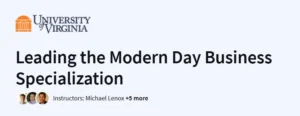What will you learn in this Financial Management Specialization Course
Financial Accounting Foundations: Learn to analyze financial statements and understand the financial information they provide.
Advanced Financial Accounting: Delve into complex accounting topics, including fixed assets, liabilities, and shareholders’ equity.
Investment Fundamentals: Understand the trade-offs between risk and return, portfolio formation, and market efficiency.
Corporate Finance Principles: Gain insights into measuring and promoting value creation, forecasting liquidity needs, and evaluating company performance.
Risk Management: Incorporate risk and uncertainty into investment decisions and understand financing strategies.
Program Overview
1. Financial Accounting: Foundations
⏳ 12 hours
Introduction to financial accounting information and its use by different capital market participants.
Recording financial information and producing main financial statements.
Understanding fundamental accounting concepts and revenue recognition criteria.
Accounting for short-term assets, focusing on accounts receivables and inventories.
2. Financial Accounting: Advanced Topics
⏳ 11 hours
Accounting for fixed assets.
Understanding accounting for liabilities.
Evaluating shareholders’ equity section of a balance sheet.
Understanding preparation and information provided by cash flows statement.
3. Investments I: Fundamentals of Performance Evaluation
⏳ 26 hours
Explaining the trade-offs between risk and return.
Forming a portfolio of securities and calculating expected return and standard deviation.
Describing market efficiency and its implications.
Conducting market multiples valuation.
4. Investments II: Lessons and Applications for Investors
⏳ 24 hours
Interpreting and using CAPM and the 3-Factor Model.
Comparing returns in the form of dividends and capital gains.
Evaluating strategies designed to “earn alpha”.
5. Corporate Finance I: Measuring and Promoting Value Creation
⏳ 24 hours
Forecasting and managing a company’s liquidity needs.
Measuring the contribution of new projects to shareholder value.
Incorporating risk into investment decisions.
Evaluating company or division performance.
6. Corporate Finance II: Financing Investments and Managing Risk
⏳ 19 hours
Understanding how companies decide on debt levels and types.
Analyzing payout decisions and their effects on firm value.
Using risk management tools to mitigate specific risks.
Developing a financial management framework for M&A decisions and R&D investments.
Get certificate
Job Outlook
The demand for financial managers is projected to grow significantly, with a 17% increase expected by 2030, according to the U.S. Bureau of Labor Statistics.
Professionals with expertise in financial management are sought after across various industries, including finance, healthcare, and technology.
Earning this specialization can enhance job prospects and credibility in the field.
Specification: Financial Management Specialization
|
FAQs
- Concentrates on decision-making for businesses, not just theory.
- Covers how to allocate resources effectively.
- Focuses on risk management and value creation.
- Applies financial tools to real-world organizational challenges.
- Prepares learners for leadership roles in finance.
- Basic familiarity with financial statements is helpful.
- Core concepts are explained clearly for beginners.
- No professional accounting experience required.
- The course builds step by step from fundamentals.
- Great for both beginners and mid-career professionals.
- Corporate finance roles in large organizations.
- Banking and investment sectors.
- Consulting firms advising on financial strategy.
- Government and nonprofit financial planning.
- Startups and SMEs needing resource optimization.
- Useful for small and medium enterprises as well.
- Helps startups manage limited capital wisely.
- Nonprofits use it for budgeting and accountability.
- Large firms apply it for strategic investment and growth.
- Universally relevant wherever money is managed.
- Uses real-world case studies for context.
- Includes financial modeling and decision-making tools.
- Focuses on applying concepts to workplace challenges.
- Encourages critical thinking over memorization.
- Prepares learners to handle live financial decisions.





